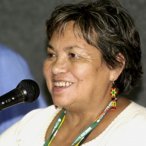English · Español

28 de enero de 2013 | Entrevistas | Cumbre de los Pueblos Santiago de Chile | Anti-neoliberalismo | Derechos humanos | Luchadores sociales en riesgo
We Won’t Disappear
Interview with Francisca Rodriguez, of ANAMURI and CLOC – Via Campesina
Descargar: MP3 (5 MB)
Francisca “Pancha” Rodriguez, of the National Association of Rural and Indigenous Women of Chile (ANAMURI), member of the Latin American Coordination of Countryside Organizations (CLOC – Via Campesina) is without question a reference of social movements not only in her country, but also at Latin American and world level.
As a peasant and social activist, she is known for her charisma, political depth, clear speeches, simplicity and generosity. An interview with her can easily transform into an exciting conversation and a lesson on political constructions and the contribution of social actors in Chile and Latin America.
Real World Radio had the privilege to speak to her again on the second day of the Summit of the Peoples in Santiago, Chile, in parallel to the European Union – Community of Latin American and Caribbean States Summit. As Pancha said, “I’m becoming a regular at the radio”, because we interviewed her a few weeks ago before the beginning of the summit of the peoples.
“This is more than we expected. Many Chilean goals are becoming true”, she said, with reference to that summit on Saturday, one day before its end.
The summit is “important” even though it wasn’t the “large space we would have wanted” and which would have been possible in other countries, with different social and political realities. In Chile, the social movement has other elements, in a country deeply affected by a coup d’ etat with strong repression that after 40 years continues to have impacts. “In this convergence space we are recreating, seeking, building; the strength of the movements will be really crucial to the urgent political and social changes we need”, said the peasant leader.
Pancha said that in Chile “we still need to understand that we don’t only need convergence, a convergence without unity could take us forever. We need a unity of thought, unity of action, on the political agenda we need to build. And I believe we are moving towards that. That’s why we need to strengthen and give identity to our
organizations, and keep fighting”.
Despite these advances, the activist once again made reference to the Chilean social processes and said that the lack of articulation is due to the fact that “we get excited thinking that power is where I stand and we don’t realize that this building should be collective, it should be done from a grassroots level, from the people, where everyone has to participate”.
However, Pancha has many expectations in the convergence space with unity that can be achieved in Chile, and made reference several times to the strength of youth
movements.
The leader of ANAMURI and CLOC also highlighted the need for a new constitution for her country, which would have to take place through a Constituent Assembly in order to build a "political proposal of change".
Thinking on the activities of the Summit of the Peoples, Pancha warned that “there is something important that we are witnessing from our identity, from our country, which is this will to learn and strengthen the processes taking place”. “We are an uninformed country, we’ve been politically, socially and culturally isolated, every time they make us believe we are the best of Latin America. This is one of the hardest hits received by our country”, with the dictatorship led by Augusto Pinochet from 1973 to 1990, said the leader. The economic success had “such a high political cost in these past 40 years after the Coup”, said Pancha, who regretted “how capitalism took over this country”.
In this way, the peasant leader highlighted that capitalism has been very effective to distort the struggles of social movements. “Historically, in our movements, due to the extension, generosity and trust among us, they (the different agents of the capitalist system) easily penetrate into our organizations. And maybe this is what has turned us today into cautious peoples and organizations”. Pancha made reference to her former partners, who then betrayed them, and highlighted the power of the state intelligence system.
“We can still feel the consequences of the military dictatorship that established this system here, and we will continue feeling them for a long time”, concluded Pancha. She also said that social building has been slower in the country. “(…) But we’ve strongly contributed to the social struggle and the articulation in Latin America. (…)
The resistance to the Dictatorship and a country that was able to articulate in a political way abroad to generate solidarity, these important political assets, have not been lost. Maybe we haven’t been able to implement it all in the country, we are implementing it also in Latin American and global processes" she added. “But this seed is growing and should blossom in Chile”. (...) We need to strengthen our left-wing heart”, concluded Pancha.
Photo: http://www.iisd.ca








